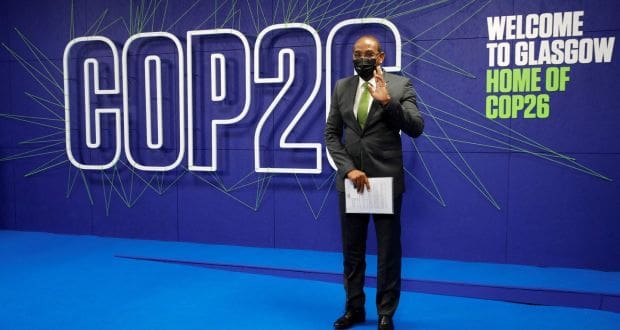
Two island nations battling rising sea levels and extreme weather such as hurricanes are taking a step they hope will pave the way to holding large greenhouse gas emitters accountable under international law.
The Caribbean nation of Antigua and Barbuda and the Pacific nation of Tuvalu have registered a new commission with the United Nations, creating the possibility of claiming damages from major polluting countries through judicial means, such as the UN’s International Tribunal for the Law of the Sea.
“Beyond the moral obligation of providing compensation, these countries also have a legal obligation to compensate,” Gaston Browne, the prime minister of Antigua and Barbuda, said in an interview at the UN climate summit in Glasgow, Scotland. “Being on the frontlines, we have an obligation to act quickly to bring this senseless burning of fossil fuels to an end … so that we can have a sustainable planet.”
In 2009, rich nations promised to give developing nations $100 billion a year by 2020 to fight and adapt to global warming. On Tuesday, U.S. special presidential climate envoy John Kerry said he expected that goal to be reached by 2023.
The money initially pledged will help nations adapt to and mitigate the effects of climate change. But Payam Akhavan, a lawyer representing both Antigua and Barbuda and Tuvalu, said by now, even that $100 billion per year is “grossly inadequate.”
“Whether it’s rising sea levels, extreme weather events, acidification, deoxygenation, the loss of fish populations, the loss of biodiversity, coral bleaching — all of those affect small island states in a disproportionate way,” he said.
Barbuda was “obliterated” by Hurricane Irma in 2017, and Tuvalu is “literally going to disappear” because of rising sea levels, he said. “How do you compensate an entire nation for the loss of their territory?”
The newest effort appears to be as much about forcing wealthy and high-polluting nations to the table as it is about the damages.

The situation is growing more and more urgent, said Browne, who is also the chairman of the Alliance of Small Island States. “It’s not just about getting the money and the technology to adapt, but it’s about mitigating to ensure that we don’t … have even more frequent and ferocious storms and more acute climate events that undermine our development and ultimately our survivability.”
The 2015 Paris Climate Accords allow governments to set their own goals to cut planet-warming greenhouse gas emissions. Under the agreement, and other UN climate accords, there are no provisions for the compulsory settlement of disputes.
The International Tribunal for the Law of the Sea, however, has a mandate to settle disputes linked to a 1982 UN convention that established an international framework of law over the marine environment. The European Union and 167 nations have ratified the UN convention. While the United States is not among them, major polluters such as China and India have ratified the agreement.
In what would be a first for the tribunal, the new commission formed by Tuvalu and Antigua and Barbuda will ask the tribunal judges whether they can claim damages from countries that warm the oceans through greenhouse gas emissions, according to Akhavan. If they can, the island nations could then pursue lawsuits in the tribunal or other international or even domestic courts.
“They are tired of empty words and vague commitments, and they now want to use international law … to reframe the whole climate change issue,” Akhavan said, adding that other island nations are likely going to join Antigua and Barbuda and Tuvalu in these efforts.
If their efforts succeed, Browne said, it would be a victory for all of humanity.
“We need to have a home just like those developed countries,” he said, “and they need to be more sensitive to our needs and recognizing that … we are all interrelated and we have an obligation to protect each other to make sure that we can all enjoy the benefits of living on planet Earth.
This would not be the first effort by small island nations to use international law to hold big polluters accountable. Pressure has been growing on the International Court of Justice in The Hague to hear such cases on climate change. And in the last several years, courts in Europe, Pakistan and Colombia have issued rulings demanding governmental action on climate change.
Steve Herz, a senior attorney for the Sierra Club who focuses on climate issues, called the latest efforts “existential.”
“It shouldn’t be surprising at all that they would turn to legal remedies when diplomacy is not delivering the outcomes they need to survive,” he said.
Advertise with the mоѕt vіѕіtеd nеwѕ ѕіtе іn Antigua!
We offer fully customizable and flexible digital marketing packages.
Contact us at [email protected]
















Will this be another situation like the case of Antigua vs the USA in reference to the gaming industry? What will be the legal fees associated with this move? Even if we win and the big countries refuse to pay, what will be our course of action?
In essence, will we be just wasting money on legal fees, or offering paybacks to some legal experts and will get nothing out of it? If the camel passes through the eye of a needle and we do get some money, what do we plan to do with the money? Do we plan to use it to further reduce emissions ourselves, like offering incentives and building infrastructure for electric vehicles; putting our electricity underground for better resiliency and etc?
Gaston Browne: Are you going to bring a law suit against our new Colonizers, the Chinese. They are the world’s number one polluters. Then again,they are the owners of ANTIGUA. My caution to you,just be careful when dealing with those Chinese. Persons have a way of disappearing never to be seen again in PUBLIC.Remember that man who is a shareholder in West Indies Oil.He was one of many removed from HONG KONG and have not been seen since.
Comments are closed.